Degradation of origin recognition complex large subunit by the anaphase-promoting complex in Drosophila
- PMID: 14609957
- PMCID: PMC275432
- DOI: 10.1093/emboj/cdg573
Degradation of origin recognition complex large subunit by the anaphase-promoting complex in Drosophila
Abstract
The initiation of DNA synthesis is thought to occur at sites bound by a heteromeric origin recognition complex (ORC). Previously, we have shown that in Drosophila, the level of the large subunit, ORC1, is modulated during cell cycle progression and that changes in ORC1 concentration alter origin utilization during development. Here, we investigate the mechanisms underlying cell cycle-dependent degradation of ORC1. We show that signals in the non-conserved N-terminal domain of ORC1 mediate its degradation upon exit from mitosis and in G1 phase by the anaphase-promoting complex (APC) in vivo. Degradation appears to be the result of direct action of the APC, as the N-terminal domain is ubiquitylated by purified APC in vitro. This regulated proteolysis is potent, sufficient to generate a normal temporal distribution of protein even when transcription of ORC1 is driven by strong constitutive promoters. These observations suggest that in Drosophila, ORC1 regulates origin utilization much as does Cdc6 in budding yeast.
Figures


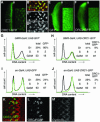
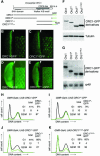
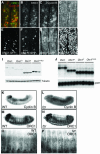
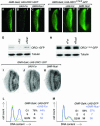
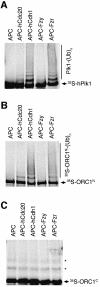

Similar articles
-
A novel motif governs APC-dependent degradation of Drosophila ORC1 in vivo.Genes Dev. 2005 Oct 15;19(20):2458-65. doi: 10.1101/gad.1361905. Epub 2005 Sep 29. Genes Dev. 2005. PMID: 16195415 Free PMC article.
-
Function of the origin recognition complex 1 (ORC1) outside DNA replication in Drosophila.Cell Cycle. 2011 Nov 15;10(22):3957-63. doi: 10.4161/cc.10.22.18133. Epub 2011 Nov 15. Cell Cycle. 2011. PMID: 22071690
-
An orc1 allele with a mutated APC motif is female sterile with amplification defects.Cell Cycle. 2012 Aug 1;11(15):2828-32. doi: 10.4161/cc.21168. Epub 2012 Aug 1. Cell Cycle. 2012. PMID: 22801552
-
Subunits and substrates of the anaphase-promoting complex.Exp Cell Res. 1999 May 1;248(2):339-49. doi: 10.1006/excr.1999.4443. Exp Cell Res. 1999. PMID: 10222126 Review.
-
Control of mitotic transitions by the anaphase-promoting complex.Philos Trans R Soc Lond B Biol Sci. 1999 Sep 29;354(1389):1583-90. doi: 10.1098/rstb.1999.0502. Philos Trans R Soc Lond B Biol Sci. 1999. PMID: 10582244 Free PMC article. Review.
Cited by
-
Mechanisms of ubiquitin transfer by the anaphase-promoting complex.J Biol. 2009;8(10):92. doi: 10.1186/jbiol184. J Biol. 2009. PMID: 19874575 Free PMC article. Review.
-
Regulation of Mammalian DNA Replication via the Ubiquitin-Proteasome System.Adv Exp Med Biol. 2017;1042:421-454. doi: 10.1007/978-981-10-6955-0_19. Adv Exp Med Biol. 2017. PMID: 29357069 Free PMC article. Review.
-
The Non-Canonical Role of Aurora-A in DNA Replication.Front Oncol. 2015 Aug 25;5:187. doi: 10.3389/fonc.2015.00187. eCollection 2015. Front Oncol. 2015. PMID: 26380219 Free PMC article. Review.
-
Nonreplicative functions of the origin recognition complex.Nucleus. 2018;9(1):460-473. doi: 10.1080/19491034.2018.1516484. Nucleus. 2018. PMID: 30196754 Free PMC article. Review.
-
A novel motif governs APC-dependent degradation of Drosophila ORC1 in vivo.Genes Dev. 2005 Oct 15;19(20):2458-65. doi: 10.1101/gad.1361905. Epub 2005 Sep 29. Genes Dev. 2005. PMID: 16195415 Free PMC article.
References
-
- Aparicio O.M., Weinstein,D.M. and Bell,S.P. (1997) Components and dynamics of DNA replication complexes in S.cerevisiae: redistribution of MCM proteins and Cdc45p during S phase. Cell, 91, 59–69. - PubMed
-
- Asano M., Nevins,J.R. and Wharton,R.P. (1996) Ectopic E2F expression induces S phase and apoptosis in Drosophila imaginal discs. Genes Dev., 10, 1422–1432. - PubMed
-
- Bell S.P. (1995) Eukaryotic replicators and associated protein complexes. Curr. Opin. Genet. Dev., 5, 162–167. - PubMed
-
- Bell S.P. (2002) The origin recognition complex: from simple origins to complex functions. Genes Dev., 16, 659–672. - PubMed
Publication types
MeSH terms
Substances
Grants and funding
LinkOut - more resources
Full Text Sources
Molecular Biology Databases

